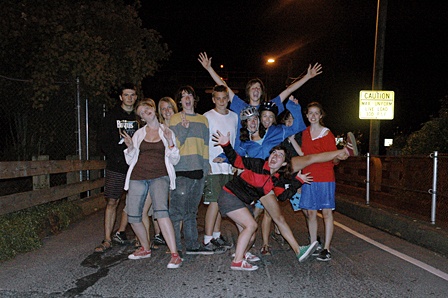Summer break isn’t what it used to be.
A group of Orcas High Schoolers spent their summer months learning about farming, gardening, blacksmithing, and carpentry with the FEAST program.
It stands for Farm Education and Sustainability for Teens, and its purpose is to teach local kids practical and positive solutions for the world around them.
“By focusing on solutions, it empowers and encourages them,” Funhouse assistant director and FEAST coordinator Whitney Hartzell said.
The program, which is offered under the umbrella of The Funhouse, debuted in the summer of 2001, but laid dormant until last year. Orcas resident Chris Evans started the project, and still helps out.
The 15 FEAST students will be hosting a slide show and dinner on Sunday, Oct. 18 starting at 6 p.m. at Oddfellows Hall to share what they learned over the summer. The meal is being cooked by Libi Geddes and Yuriko Bullock and will feature island grown, seasonal foods.
The students experienced farming and gardening and spent time at the Bullock’s farm, La Campesina Project, Morning Star Farm, and the Coffelt’s farm. They volunteered with the Land Bank to clean up Judd Cove, went on native plant walks, grew oyster mushrooms at home, learned about using human waste for compost, were taught how to blacksmith, and built a cob bench and timber frame shed for The Funhouse. They even made a trip to Lopez to check out the school’s farm to cafeteria program, Lopez Community Land Trust’s new sustainable housing units, and the S&S Homestead.
The kids’ community service project involved mycoremediaton, which uses fungi to remove contaminates from soil. The crew prepared a series of trenches across the bioswale at Island Market in which they placed straw that they had inoculated with oyster mushroom spawn. Adding a mycofiltration component strengthens the system’s ability to remove toxins from stormwater as it passes from the parking lot through the swale and on into the surrounding ecosystem. “Team Fungi” installed a similar set-up at Country Corner for a swale that retains stormwater runoff from the roof and parking lot.
Junior Halley McCormick’s favorite activity with FEAST was blacksmithing.
“It was something I never envisioned myself doing, but I enjoyed it immensely and learned a lot from it,” she said. “This was my first FEAST year. It’s something I would definitely recommend to anyone. I wish I had done it last year and gotten into the action.”
This year, 30 volunteers helped with either teaching classes or providing in-kind donations. Hartzell says it’s wonderful for the teens to “see community members – who they just knew in passing – really shine.”
“This program is entirely community-supported,” she said. “It’s made possible by donations and an Orcas Community Foundation grant. We have a really great group of donors.”
Hartzell’s favorite part of the FEAST activities is watching the growth of the students’ knowledge.
“The difference in the quality of their questions from when they start to when they are done is amazing,” she said. “And I love it when the kids come in and say, ‘my tomatoes are doing really well,’ or parents tell me, ‘my child is taking over the garden.’”
The students receive 180 hours of class time for participating, and many carry their knowledge over into the school year.
“Some of the kids are taking what they learned and using it for their senior projects,” Hartzell said. “A lot of the kids have come back and said, ‘I want to do this all year.’ One of last year’s seniors went on to work at a goat farm. It’s inspired a lot of them to at least grow their own food.”



